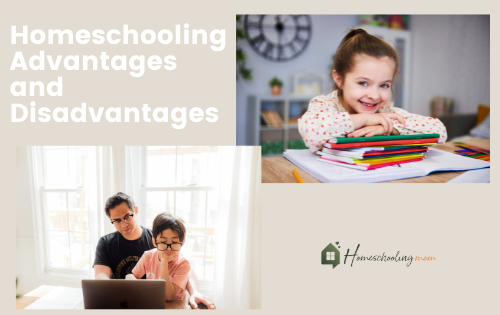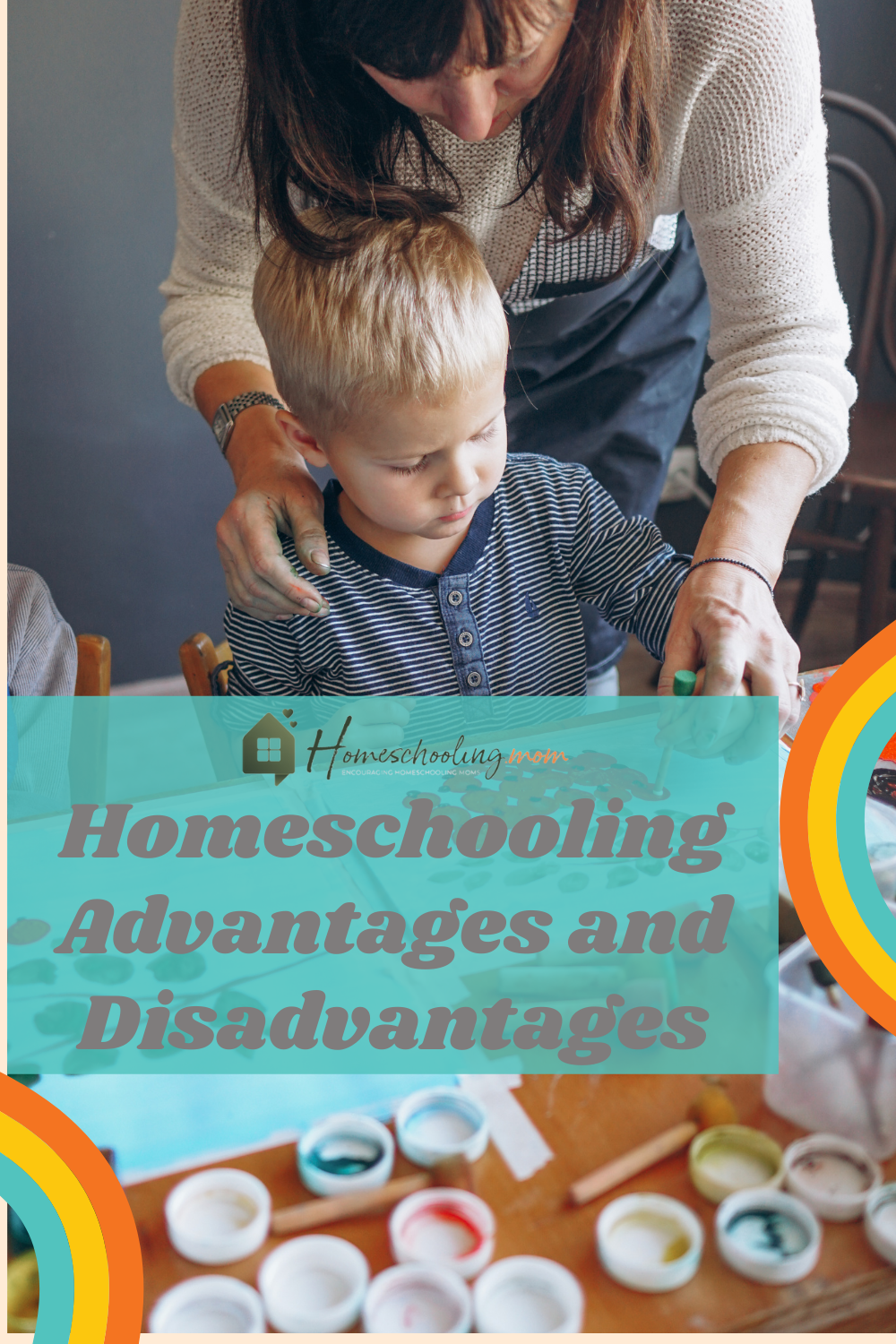Homeschooling Advantages and Disadvantages
As families embark on a new homeschool journey, it’s important to know that there are both homeschooling advantages and disadvantages. Of course, for many families, the advantages of homeschooling far outweigh the disadvantages of homeschooling, given the results of the process. But we’ll go into a little more detail as we proceed through this article.
If you’ve never considered homeschooling before, let us help weigh your options to find out if it’s the right step for your family. If you’ve tried and failed, this article might help by shedding some light on the reasons you feel like you failed.

Why You Would Choose Homeschooling
For the simplest answer, I’ll just say “because this is YOUR child and YOUR right to do so”. Each state has its own set of homeschool laws and regulations, which you can find HERE, and each family has its own very specific reasons for wanting to homeschool. Here are just a few of those reasons:
- Having a special needs child that is better served at home
- Having a gifted child who learns much faster than public school peers
- Desiring a higher quality of education than what is offered in public school
- Desiring a safer atmosphere, free from socialized religious, moral, and political indoctrination
- Desiring a safer atmosphere, free from bullies and peer pressure, and one that encourages healthy social interaction
- Preparing for a specific career emphasis
- Having the opportunity to travel extensively
Of course, there are far more reasons to homeschool, and yours might be completely different than these listed. The good news is, you do not have to ask permission, so your reasons for homeschooling are valid and are yours and yours alone.
There are many reasons for homeschooling your child. Some people find out some very compelling truths about the history of public education and decide they do not want their child to have any part of it. To find out more about this for yourself, feel free to click over and read A Brief History of Public Education, and The Legacy of John Taylor Gatto.
For many people, finding out about these topics prompts greater research into public education as a whole. And once you’ve gone deep enough, you’ll find enough to make you want to remove your children from the system, if they’re in it, or homeschool right from the start.
Homeschooling just makes sense, especially in cases where public school doesn’t quite fit. But it makes even more sense when you realize that the overall goal of public education has nothing to do with “education”. As you begin to research along these lines, be sure to consider your sources and references.
Advantages of Homeschooling
The advantages of homeschooling will vary, depending on the age level of the child you’re teaching. For instance, homeschooling the younger grades can allow you to spend quality time with your little ones, never missing a single thing as they grow and learn. This is the very best time to begin to cultivate a true love of learning. You can create an atmosphere that immediately connects learning with fun, and not the harshness and strictness that is so often present in public school. It’s easy to make learning fun when you can utilize different resources, take lots of breaks, do nature studies, take fun field trips, use recess as a part of the learning process, and use fun as a springboard for lots of different topics.
The early years, such as preschool and kindergarten, can also be a great time to turn hobbies and passions into great avenues for learning. Music, for instance, can be an excellent way for the auditory learner to take in information. Music, rhyme, and sound patterns can all work together to not only help solidify information to be learned, but also to help create a calm mind.
The benefits of homeschooling extend into the building up of your child. It helps to eliminate some of the concern for your child to have low self-esteem and confidence. From bullies to teachers who don’t understand the energetic need of our little ones, children can often become trapped in a model that does everything but promote learning, in traditional school. In your homeschool, however, you can allow your child to bloom and truly be themselves, learning at the rate that’s best for them, in a safe environment.
In middle and high school, the advantages change a bit. Perhaps you only pulled your child out of public school after a few years, so you didn’t get the homeschool start you could have had, but that’s no reason to worry. The truth is, it’s never too late to start over. By doing so, you can even go back and check for foundational education gaps that could otherwise cause lots of problems in the upper grades. You can’t build on something that isn’t there, especially in math. So, if your child was a victim of the No Child Left Behind rhetoric, you can still allow them to catch up.
In the middle and high school grades, you can truly put a lot of fears to rest. Considering the amount of violence carried out in schools, not the least of which is gun violence and bullying that leads to suicide attempts, it’s definitely a safer option in many ways. Anxiety and depression run rampant through our teen and preteen aged children and much of the source of those afflictions come from the public school system itself and what they are subjected to there.
Your protection goes a step further, as well, in safeguarding against political and anti-Christian agendas. These days, too many children can recite the political leanings of their teachers, and this simply should not be. At the same time, various world religions are not only taught but sometimes even forced on children as young as kindergarten age! Many schools now teach Islam while at the same time banning Christian sentiments in the same classroom.
Another advantage for the children in upper grades is the ability to get a jump on college. For the most part, it’s impossible to get ahead in public school. If a child is in the ninth grade, then they must do ninth grade work and only ninth grade work. A homeschooled child, however, is free to move on as they learn, setting a course for themselves that can lead to amazing things. They can even take dual enrollment classes that offer college credit as well, which can really come in handy when they’re ready to apply for the college of their choice.
Even if your older children are not planning to attend college, the homeschool environment can be a huge benefit by allowing them to get vocational training they would certainly not get if they were enrolled in public school. They’ll be able to take on volunteer work, entrepreneurial placements, internships, in addition to the normal extracurricular activities present in a traditional school setting. By the time they graduate, they will have already received a great deal of on-the-job training that will provide a great foundation to build upon in their employment field of choice.
One of the best things about homeschooling, no matter how old your children are, is the ability to customize their learning materials. You as the homeschool parent and educator will have full educational control over the type of homeschool curriculum you'll teach from. For some, this might mean choosing a prepackaged curriculum, complete with textbooks, workbooks, resources, add-ins, lesson plans, and teacher’s guides. This whole approach is available from a wide variety of curriculum vendors and offers excellent stability and ease of access. For homeschooling parents who also work a full-time job, it’s especially wonderful because everything is preplanned ahead of time. All you have to do is open up your materials on any given day, and you’ll know exactly where you are.
Other homeschoolers prefer to organize a curriculum that meets a very specific set of needs. This is perfect for special needs students, gifted students, or students who excel in one subject, such as literature, but fall a bit behind in others, like mathematics. You might also find that your child does very well with independent learning in some subjects but needs a lot of guidance in others. Streamlining your curriculum to specifically fit these needs can make a world of difference for these children.
In the upper grades, socialization is always easier, and always better. For instance, instead of being locked into a group of same-age peers, your homeschooled older child will be able to interact with people of all different ages in a variety of settings. Some of those settings will be real world scenarios that will actually help your child learn about the world at large, how to interact with society, and how better to apply life lessons they’ve learned in other ways. Joining private homeschool clubs or co-ops is another great way for multi-age relationships, e.g. sports team participation, camps, and church-based activities. With so many different avenues to socialization, you’re sure to find that you have a very well-rounded young person by the time graduation rolls around.
As a homeschooling family, you’ll be able to take homeschooling with you, even if you travel extensively. Family vacations could actually turn into learning experiences and everyday outings can just be an extension of the homeschool “classroom”. This way, you’re free to schedule appointments, vacations, leisure activities and more, anytime it best works for you. Take advantage of seasonal discounts, cheaper travel rates, and more because you’re not hemmed in by a public school calendar.
For the child in public school, “sick days” (or weeks) can mean tons of “catch up work” when they return to school. Their grade level can deteriorate through no fault of their own, and their self-esteem, right along with it. In homeschool, however, you can go right on learning through even a sick day, because you can utilize other ways of learning, including reading, devices, television, and more. Or, if you’re doing year-round homeschooling anyway, you can just ride out the illness in complete relaxation and rest, truly giving them the time they need to recuperate properly.
The advantages of homeschooling extend into the child's education by allowing extra time to do the work they struggle with, whereas in public school they are pushed, and often left out if they fall behind, causing reason for worry and an education lacking in depth. Homeschooled students will find that their flexible schedule will allow a lot of time to pursue their passions.
Disadvantages of Homeschooling
As I mentioned early on in this article, there are some disadvantages of homeschooling. Some parents only find them to be more of a “challenge” as opposed to an actual disadvantage, but I felt it necessary to mention a few, just to make sure you are prepared.
One disadvantage that many parents speak of is the amount of time it can take to prepare for a homeschool day, week, month, or year. This can vary, based on how you choose and utilize the curriculum, especially if you piece it together one resource at a time. When you turn away from prepackaged curriculum sets, you will more than likely have to create your own lesson plans, which can heap on hours of work, depending on the age of your child. This can be doubled or tripled as you read essays, grade papers, or prepare transcripts.
The good news is, this is time well-spent and will be worth every minute in the end. To invest in your child’s future by helping them to be the very best they can be at every level of their learning experience speaks volumes about your priorities and values. For lesson plans, there are tons of resources online including templates, tutorials, and pre-made plans based on specific resources. It might take a little searching, but you’re sure to find everything you need if you try.
There’s also the disadvantage of being a mom, teacher, principal, librarian, lunch lady, school nurse, and counselor, all rolled into one. If ever there were a life situation that required multitasking at Olympic levels, this is it! You’ll learn that many of these positions can actually be filed away under the “Mom” heading anyway, so you’re already halfway there. On the other hand, you’re also in charge of the school schedule, so you can tweak that as needed to help maintain everyone’s mental well-being and peace of mind.
For families homeschooling the special needs child, those positions mentioned above are only a starting place. You’ll also be a speech and language therapist, occupational therapist, physical therapist, and so much more. In public school, the special-needs child is shuffled among a lot of different classrooms, and the adults and aids that go along with them. In your homeschool, you won’t often have that option unless you actually have professionals who come into the home for specialized therapies.
A common disadvantage, however, is the necessity of dealing with the naysayers that you’ll face over the course of your child’s homeschool education. Many times, these are members of your own family, friends, people from church, and any random stranger that doesn’t understand how you can “be out with your kids during school hours”. Allowing your children to play outside during those hours can often warrant nasty glances and actual comments from nosy neighbors, while a few unfortunate homeschooling families even have to endure those same neighbors calling the ‘officials’ on them for any little thing they think is wrong. That, of course, reveals a ‘neighbor’ problem that goes much deeper than just homeschooling.

In Closing
These are only a precious few of the homeschooling advantages and disadvantages you can expect through homeschooling your child. There have actually been books written about the pros and cons of homeschooling, and they are far more extensive than this simple article has touched on. As you begin to define your own specific needs, your child’s learning style, or your own teaching style, you’ll find more and more advantages and disadvantages of your own homeschooling experience, even if they’re only yours.
The important part is that you identify those pros and cons, for your family, and fully deal with them. That’s a great way to give your child the education they need and deserve and, in turn, giving them a great chance for their very best future. It’s YOUR child, YOUR homeschool, and YOUR future. Make the most of it!









Stacey Wells
Stacey is an author, blogger, and former homeschool mother who loves to encourage and uplift, especially on the subjects of faith and homeschooling. She lives in Central Kentucky with her husband, Jimmy, and their two children. For more information, visit her website, Words From The Wheel.